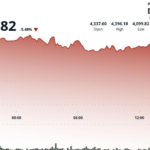Traders at the New York Stock Exchange witnessed a striking juxtaposition this week as an unexpected surge in stock market growth continued to unfold amidst ongoing economic concerns. While many had anticipated a potential recession, the latest economic data suggests a more resilient consumer landscape, defying pessimistic expectations.
Recent reports reveal that consumer spending in August exceeded forecasts, contributing to a stronger overall economic narrative. Despite inflationary pressures, households are continue to invest in larger purchases, buoyed by relatively stable incomes. Housing markets also showed resilience, with new home sales reaching their highest levels in three years.
Historically, such economic trends have been fueled by governmental stimulus and low interest rates. However, analysts are now attributing part of this growth to a “wealth effect” stemming from robust performance on Wall Street. Mark Zandi, chief economist at Moody’s Analytics, noted that wealthier households are feeling optimistic about their financial situations due to rising stock portfolios, leading to increased consumer spending.
This upward trend in the stock market has indeed been notable, with major indexes including the Dow Jones Industrial Average and Nasdaq Composite experiencing impressive gains of over 9% and 23%, respectively. Analysts suggest that this uptick can be attributed to a combination of substantial investments in artificial intelligence, strong performances from major industrial and communications companies, and a buoyant stock market overall.
However, consumer sentiment remains a complex issue. According to the University of Michigan, sentiment has seen a steady decline this year, dropping 23% since January. In September, the gauge fell by 5.3%, although an anomaly was noted: consumers with larger stock holdings maintained steady confidence while those with fewer assets expressed growing concern.
This discrepancy highlights a critical aspect of the market: wealth concentration. The top 10% of earners in the United States hold 87% of the stock market’s assets, which may explain the divergent sentiment among consumers. Zandi cautions that the economy’s current strength could be fragile, warning that any downturn in the stock market could lead to decreased consumer confidence and a rise in savings, potentially signaling a recession.
Valuations in the stock market have raised eyebrows, particularly the S&P 500’s trading at 22.5 times expected earnings—well above both its five-year and ten-year averages. Despite these concerns, consumer spending data painted an optimistic picture. August saw a 0.6% boost in spending, with inflation-adjusted figures indicating resilience despite rising prices.
While inflation rates still surpass the Federal Reserve’s target, with core inflation at 2.9%, monthly increases align with forecast trends, possibly paving the way for upcoming rate cuts. Economic growth also showed promise, with an annualized GDP growth rate of 3.8% in the second quarter, alongside positive revisions for the third quarter’s growth expectations.
Further bolstering the positive narrative, durable goods orders unexpectedly rose, and new home sales climbed by an impressive 20%. Despite a recent uptick in jobless claims, layoffs have remained low, showcasing an ongoing demand for labor, albeit with stagnant payroll growth.
While the current economic indicators reflect stability, economists caution against complacency. Elizabeth Renter, a senior economist at NerdWallet, pointed out the fragility of consumer sentiment, particularly among those not benefiting from stock market gains. The growing divide in perceptions of economic health remains a key concern, as rising food prices and other inflationary pressures loom on the horizon.
In conclusion, while the U.S. economy showcases signs of resilience fueled by both consumer spending and stock market gains, there exists an undercurrent of uncertainty. The broader effects of inflation and labor market challenges continue to weigh on consumer sentiment, suggesting that while the economy may currently be on solid ground, its future remains delicately poised.







